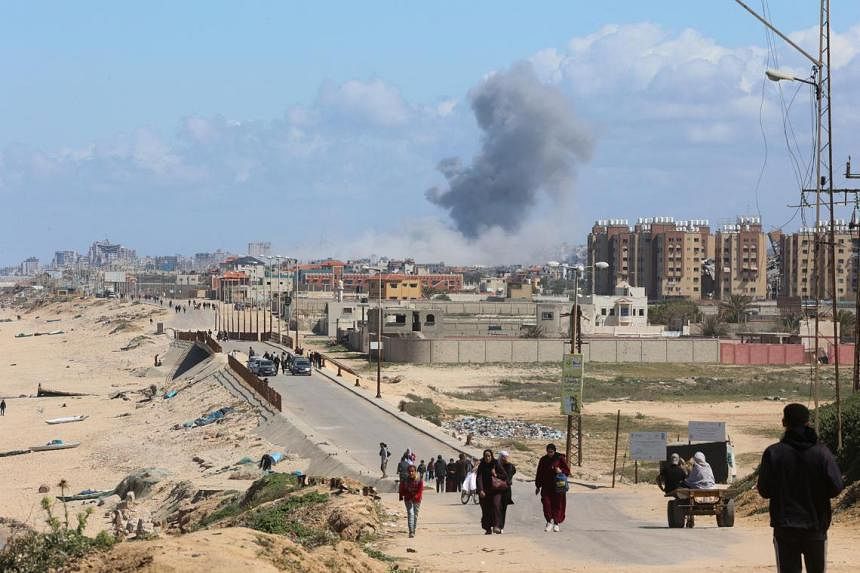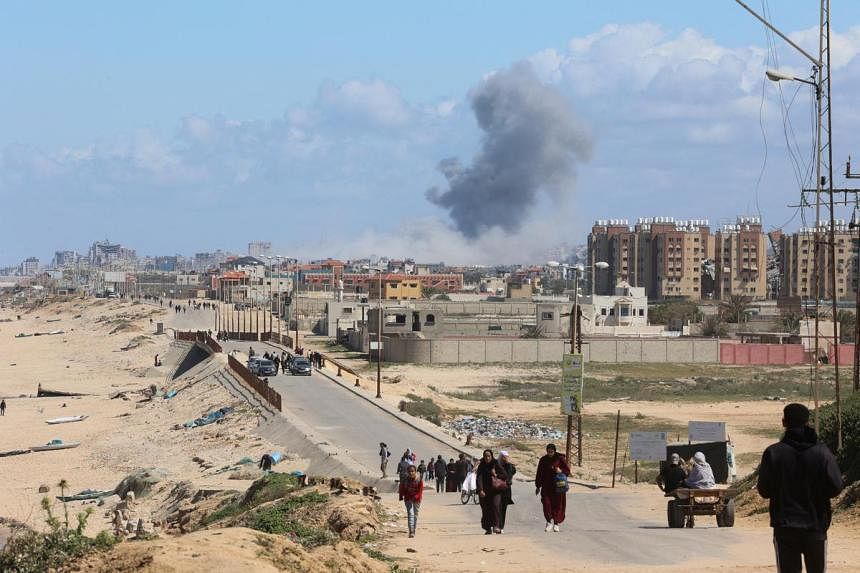DOHA/JERUSALEM - Israeli Prime Minister Benjamin Netanyahu dismissed international pressure on March 17 and said he would keep on with the military campaign against the Palestinian militant group Hamas in Gaza, even as ceasefire talks were set to resume.
Speaking at a Cabinet meeting, Mr Netanyahu said Israel would push into Rafah city, the last relatively safe place in the tiny, crowded Gaza enclave after more than five months of war.
“We will operate in Rafah. This will take several weeks, and it will happen,” he said, without clarifying if he meant the assault would last for weeks or would begin in weeks.
Israel’s allies have repeatedly urged Mr Netanyahu not to attack Rafah, where more than a million displaced people from other parts of Gaza have sought shelter, without a plan to protect civilians.
German Chancellor Olaf Scholz, who is in Jordan before a planned visit to Israel, said an assault on Rafah would make regional peace “very difficult” and that efforts now were “about ensuring we come to a long-lasting ceasefire”.
Mr Netanyahu hit out at the pressure from Israel’s allies, saying: “Are your memories that short? Have you so quickly forgotten Oct 7, the most horrific massacre of Jews since the Holocaust? Are you so quick to deny Israel the right to defend itself against the Hamas monsters?”
He has said Israel has a plan to evacuate civilians from Rafah, but aid agencies and Israel’s allies remained sceptical.
The main United Nations aid agency operating in Gaza said on March 16 that acute malnutrition was accelerating in the north of the Palestinian enclave.
More than five months of war and an Israeli siege have led to dire humanitarian conditions in Gaza, where the UN has repeatedly warned of looming famine for the coastal territory’s 2.4 million people.
The UN Relief and Works Agency for Palestine Refugees (UNRWA) said one in three children under the age of two in northern Gaza is now acutely malnourished, putting more pressure on Israel over the looming famine.
Truce still on the table
On March 15, Israel said it would send a delegation to Qatar for more talks with mediators after Hamas presented a new proposal for a ceasefire with an exchange of hostages and prisoners.
The delegation will be led by the head of Israel’s Mossad intelligence agency, Mr David Barnea, a source familiar with the talks said.
Mr Netanyahu’s office has said that the latest Hamas offer was still based on “unrealistic demands”. But a Palestinian official familiar with mediation efforts said chances for a deal looked better with Hamas having given more details on the proposed prisoner swop.
“The mediators felt positive about Hamas’ new proposal. Some in Israel felt the group made some improvement on its previous position, and it is now in the hands of Netanyahu alone to say whether an agreement is imminent,” said the official, who asked not to be named.
Israeli Defence Minister Yoav Gallant, in an apparent reference to the negotiations, said the security establishment “is committed to exhausting every possibility and willing to take advantage of every possibility, including the current one, to return the hostages to their families”.
Efforts failed to secure a temporary ceasefire before the Muslim holy month of Ramadan started a week ago.
The Hamas offer, reviewed by Reuters, foresees dozens of Israeli hostages freed in return for hundreds of Palestinians in Israeli jails during a weeks-long ceasefire that would let more aid into Gaza. Hamas also called for talks at a later stage on ending the war, but Israel has said it is only willing to negotiate a temporary truce.

Senior Hamas official Osama Hamdan told Al Jazeera that the group’s proposal is so realistic that “no one can object to it” and claimed mediators had reacted positively.
He said it consists of two stages, with a complete “cessation of aggression” at the start of the second one – something Israel has rejected, vowing to resume its goal of destroying Hamas once any truce expires.
Families of Israeli hostages and their supporters again gathered in Tel Aviv, urging a deal for their release.
At the same time, anti-government protesters, estimated by Israeli media at a few thousand, called for new elections and blocked streets in Tel Aviv.
Humanitarian crisis
The war began on Oct 7 when Hamas sent fighters into Israel, killing 1,200 people, mostly civilians, and seizing 253 hostages, according to Israeli tallies.
Israel’s ground and air campaign has killed more than 31,500 people, mostly women and children, according to health authorities in Hamas-run Gaza. Israel says it has killed at least 13,000 Hamas members.
The assault has forced many inhabitants from their homes, leaving much of the territory in rubble and triggering a hunger crisis.
“Children’s malnutrition is spreading fast and reaching unprecedented levels in Gaza,” UNRWA said in a social media post. Hospitals in Gaza have reported some children dying of malnutrition and dehydration.
Later, Palestinian media outlets said aid trucks had reached the northern Gaza areas of Jabalia, Beit Hanoun and Beit Lahiya for the first time in four months. The 13 trucks carrying flour arrived at an UNWRA facility, according to the reports.
Western countries have called on Israel to do more to allow in aid, with the UN saying it faced “overwhelming obstacles” including crossing closures, onerous vetting and unrest inside Gaza.
Israel says it puts no limit on humanitarian aid for Gaza and blames slow aid delivery on a lack of capacity or inefficiency among UN agencies.
A first sea shipment of aid into Gaza by the World Central Kitchen, using a new route via Cyprus, arrived on March 15.
A second cargo of food aid was ready to depart, Cypriot President Nikos Christodoulides said, while the United States and Jordan carried out an air drop of humanitarian aid.
Jordan’s Queen Rania told CNN that the airdrops were “literally just drops in the ocean of unmet needs” and accused Israel of “cutting off everything that is required to sustain a human life: food, fuel, medicine, water”. REUTERS



